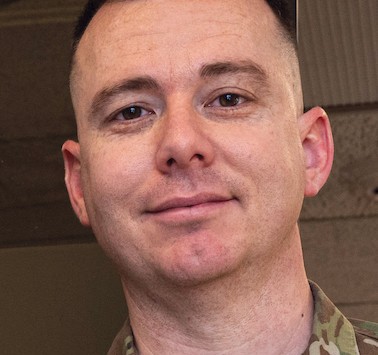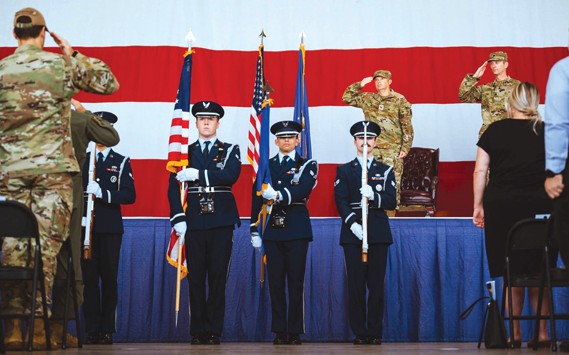KEESLER AIR FORCE BASE, Miss. — It was a zero illumination night in a MH-53 Pave Low helicopter above the New Mexico desert when two pilots experienced a malfunction in their flight controls during a training mission. Normally, protocol is to land immediately. Due to the unique circumstances of that night, the flight crew hesitated to do so.
“We didn’t know what the area below us really looked like,” said Maj. Gen. Timothy Leahy, Second Air Force commander. “It could’ve been rolling terrain and when we hit the ground, the helicopter could’ve rolled over and burst into flames. Everyone could’ve died.”
Amidst all of the chaos, at the tail of the aircraft, a student gunner on his second flight ever in the Air Force, squeezed his radio. “Pilot, tail,” he said, trying to reach the instructors.
At that time, Leahy couldn’t have known the following exchange would change how he chose to lead his Airmen.
“Stand-by tail,” the lead instructor replied, but the student was vigilant in getting his message across. “Pilot, tail,” the student said again. “Stand-by tail,” yelled the pilot.
After a lengthy back-and-forth, the pilot became fed-up.
“Dammit tail, if you squeeze that button one more time, I’m unplugging you from the system,” the pilot said.
There was a short pause then the radio clicked back on. “Pilot, tail,” the student replied.
As one of the instructors was about to unplug the student from the communication system, then Leahy stopped him.
“Everyone stand-by,” Leahy said. “Go ahead tail.”
“I think we should turn off the number two generator,” the student gunner said.
Immediately, a livid flight chief, who was a systems expert who had plenty of experience on the Pave Low, replied.
“The number two generator has nothing to do with the flight control system. You’re wasting our time,” the flight chief said.
“Stand-by all,” Leahy said. “Tail, pilot. Why do you think we should turn off the number two generator?”
“Sir,” the student gunner said, “I flew this tail number on my first flight and we had a similar problem. We solved it by turning off the number two generator.”
Leahy instructed the flight engineer to turn off the number two generator and the flight controls came back on. The entire crew returned to base in disbelief. The flight team was stunned and confused, but most importantly, they were alive.
This altered the way Leahy commanded because it showed him that an Airman’s voice should always be heard, no matter their rank or experience. Their input could change the outcome of missions, spark thought for innovation and even save lives.
At that time, Leahy didn’t know that he would one day take command of Second Air Force, which is responsible for technical training, or that he could give all Airmen in training, like the one who saved his life, a voice.
“As a lieutenant, I was just happy to make it into flight school,” Leahy said. “I didn’t know where it would take me after that.”
Leahy commissioned in the Air Force as a pilot in 1986, logged over 3,200 flying hours in 14 different aircraft and commanded at numerous levels in the Air Force. He has served for nearly half of the time the Air Force has been a service and has definitely left his mark along the way. He will retire Dec. 1 with more than 34 years of military service.
Leahy has been a part of many teams that have made contributions to the advancement of the world’s greatest Air Force, but no matter what position he held on a team, he never failed to give the ones on the ground-level a voice.
“The Air Force, just like any other organization, is all about the people,” Leahy said. “As long as you take time to listen to the people, the answer always comes out. Talking with the Airmen who are on the ground doing the job is where I’ve found success.”
Leahy has impacted the lives of many throughout his career. He has inadvertently impacted lives by simply being an example of what an Airman is supposed to be.
After a Special Forces raid in Kuwait during the Gulf War, the U.S. recaptured their embassy, the people of downtown Kuwait were celebrating their liberation. They rushed up to U.S. military members, enthusiastically hugging them.
“One of the young kids wrapped around my leg and was hugging me,” Leahy said. “There was an older gentlemen crying and we asked if he was okay and if he needed any assistance.”
To this day, Leahy never forgot what the man said to him.
“My entire life you have been the infidel,” the old man said. “I have been raised to think you were the enemy, yet my Iraqi brothers have done horrific things to us. That is my grandson on your leg. Up until today, any time he has seen a soldier he ran away and hid under his bed because he has seen what horrible things soldiers do. Today he is hugging you and he is as happy as I have ever seen him in his life because he knows the Americans are here to save us. You gave us the greatest gift one can give, you gave your life to save our lives.”
Leahy explained that stories like this are why we serve: to liberate the oppressed, free those who are enslaved and provide a better life for them.
“How could I not love the U.S. Military,” Leahy asked, rhetorically.












